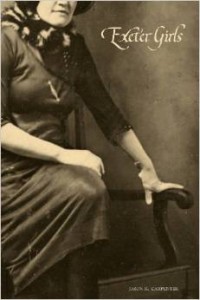 I never knew much about the Ladd School growing up. I don’t even remember hearing about it until the late 1990s when I overheard someone telling a friend that it was an abandoned and haunted mental institution. I had images of The Shining mixed with One Flew Over the Cuckoo’s Nest stuck in my head, and then forgot about it. Fast forward a decade and I get a job working with adults with disabilities, reminding me that the Ladd School existed, though in a much different form. I now worked with and for staff and clients of the institution, and a fascination grew. The empty buildings (the ones left, anyway), all tell stories of what once was. They’re not all pretty, and people with disabilities have much better lives out of the institution, but I would love to hop in a time machine and see the Ladd School in full swing, sort of.
I never knew much about the Ladd School growing up. I don’t even remember hearing about it until the late 1990s when I overheard someone telling a friend that it was an abandoned and haunted mental institution. I had images of The Shining mixed with One Flew Over the Cuckoo’s Nest stuck in my head, and then forgot about it. Fast forward a decade and I get a job working with adults with disabilities, reminding me that the Ladd School existed, though in a much different form. I now worked with and for staff and clients of the institution, and a fascination grew. The empty buildings (the ones left, anyway), all tell stories of what once was. They’re not all pretty, and people with disabilities have much better lives out of the institution, but I would love to hop in a time machine and see the Ladd School in full swing, sort of.
Jason Carpenter has been studying the Ladd School since 2001, and became obsessed with it in the process. He wrote four books about the Ladd School, including his most recent, Exeter Girls. This non-fiction work follows three women who were institutionalized during the 1920s. Done through only letters, this paints an interesting portrait told from many different points of view. I was a little worried when I realized that these three stories were told only from letters discovered, but it was easy to follow. Granted, there wasn’t the omnipresence that other books have, but I liked that all sides got their points across. It’s not often that a book can be solid with very little prose.
The three girls, Evelyn, Cora and Dorothy, all were diagnosed with a developmental disability, or “moron,” as their mental status claimed them to be. It wasn’t the developmental disability that landed them in the institution, then known as the School for Feeble-Minded. Instead, it was their promiscuity and illegitimate children that landed them there. The letters, written by mothers (who wanted their daughters home to help around the house and earn money), social workers (the girls became products of the state), boyfriends, doctors, lawyers, siblings and Joseph Ladd himself, told each girl’s story quite well while still leaving something to the imagination (it’s impossible to read this without having questions about some things). Each tale is fascinating and there is closure to all of them, each with a different fate.
The most amazing thing about Exeter Girls is the way women were treated during this time period. It seems like the honchos making the decision were more focused on protecting society than protecting the people who needed it. The School for Feeble-Minded hid away those with disabilities, putting them to work and (I’m guessing) profiting off of them. Reading some of the letters was heartbreaking, especially the ones written by the girls themselves.
Though anyone not considered socially normal will always get looks as people (i.e., jerks) have trouble adjusting to those who are different, its good to see that society is progressing. I’d like to think that what these girls suffered through would not happen today. In my mind, which tends to be trusting and trying to find the best in people, each girl would be given the support they need to successfully raise their children and the education and skills to make safe and rational decisions. Exeter Girls gives a historical blast to the past, making readers breathe a sigh of relief that times have indeed changed.